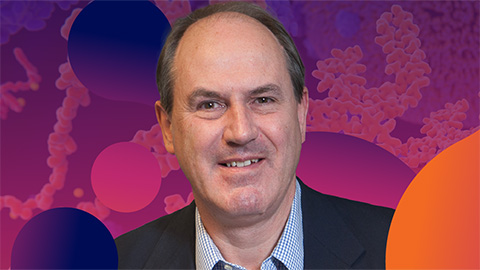Mitochondria and metabolites
in action
Mitochondria are dynamic organelles important in mediating cell and tissue homeostasis. In this track, we will hear exciting new updates on the role of mitochondria beyond energy production in metabolism, ion homeostasis, and determination of the fate of cells and tissues by metabolites and their transporters.
Keywords: NAD, metabolite and ion transporters, sirtuins, mitochondria, metabolism.
Who should attend: students, postdocs and anyone interested in mitochondria, metabolism, and health.
Theme song: “Thunder” by Imagine Dragons
This track is powered by mitochondria.
Talks
- Modulating de novo NAD synthesis — Johan Auwerx, École Polytech Fédérale de Lausanne
- NAD homeostasis and compartmentation — Joseph A. Baur, University of Pennsylvania
- Chromatin regulation and genome maintenance by mammalian SIRT6 and SIRT7 — Katrin F. Chua, Stanford University
- Metabolic competition in the tumor microenvironment — Marcia Haigis, Harvard Medical School
- Glutamine transporter as a target of mTOR signaling modulating longevity — John Sedivy, Brown University
- Neuroprotection through control of mitochondrial pyruvate transport — Anne Murphy, Cytokinetics Inc.
- Local and systemic actions of hepatic fatty acid oxidation — Michael Wolfgang, Johns Hopkins Medicine
- Physiopathological roles of the mitochondrial calcium uniporter — Anna Raffaello, University of Padova
- Microbiome catabolites as novel modulators of cellular glucose and energy metabolism — Gary Williamson, Monash University
- Metabolic modulation of cardiac health: The role of glucose and amino acids — Rong Tian, University of Washington
- Control of macrophage activation by coenzyme A — Ajit Divakaruni, University of California, Los Angeles
- Mechanisms of metabolite control over adipose tissue function — Edward Chouchani, Harvard University
Enjoy reading ASBMB Today?
Become a member to receive the print edition four times a year and the digital edition monthly.
Learn moreFeatured jobs
from the ASBMB career center
Get the latest from ASBMB Today
Enter your email address, and we’ll send you a weekly email with recent articles, interviews and more.
Latest in Careers
Careers highlights or most popular articles

Upcoming opportunities
ASBMB's PROLAB award helps graduate students and postdoctoral fellows spend up to six months in U.S. or Canadian labs.

From humble beginnings to unlocking lysosomal secrets
Monther Abu–Remaileh will receive the ASBMB’s 2026 Walter A. Shaw Young Investigator Award in Lipid Research at the ASBMB Annual Meeting, March 7-10 in Washington, D.C.

Chemistry meets biology to thwart parasites
Margaret Phillips will receive the Alice and C. C. Wang Award in Molecular Parasitology at the ASBMB Annual Meeting, March 7-10 in Washington, D.C.

Decoding how bacteria flip host’s molecular switches
Kim Orth will receive the Earl and Thressa Stadtman Distinguished Scientists Award at the ASBMB Annual Meeting, March 7–10, just outside of Washington, D.C.

Defining JNKs: Targets for drug discovery
Roger Davis will receive the Bert and Natalie Vallee Award in Biomedical Science at the ASBMB Annual Meeting, March 7–10, just outside of Washington, D.C.

Upcoming opportunities
No matter where you are in your career and what future path you aspire to, everyone needs leadership skills. Join ASBMB for practical strategies for building and practicing leadership skills.


